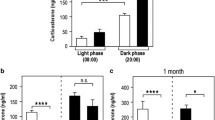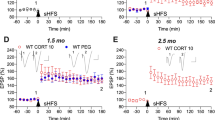Abstract
Oral pretreatment with aldosterone or corticosterone blocked the memory-enhancing effects of the calcium antagonist nimodipine, the ACE inhibitor captopril, the NMDA blocker CGP 37 849, and the glycine antagonist strychnine in a passive-avoidance test in mice. The memory-disturbing effects of phenobarbitone, diazepam, CGP 37 849 and scopolamine were not influenced by the hormonal pretreatment. These findings could indicate the involvement of a steroid-sensitive mechanism in drug-induced improvement of memory. In the light of clinical observations showing elevated cortisol levels in Alzheimer patients, the results might also explain why only a limited number of these patients respond to therapy with memory enhancers.
Similar content being viewed by others
References
Aloe L (1989) Adrenalectomy decreases nerve growth factor in young adult rat hippocampus. Proc Natl Acad Sci 86:5636–5640
Altman HJ, Quartermain D (1983) Facilitation of memory retrieval by centrally administered catecholamine stimulating agents. Behav Brain Res 7:51–63
Altman HJ, Nordy DA, Oegren SO (1984) Role of serotonin in memory: facilitation by alaproclate and zimelidine. Psychopharmacology 84:96–102
Bartus RT, Dean Pontecorvo MJ, Flicker C (1985) The cholinergic hypothesis: A historical overview, current perspective, and future directions. In: Olton DS, Gamzu E, Corkin S (eds) Memory dysfunctions: an integration of animal and human research from preclinical and clinical perspective. NY Acad Sci, New York, pp 332–358
Davies HP, Squire LR (1984) Protein synthesis and memory: a review. Psychol Bull 96:518–559
Dempster AP, Laird NM, Rubin DB (1977) Maximum likelyhood from incomplete data via EM algorithm. J Roy Statist Soc Series B 39:1–38
Deyo RA, Straube KT, Disterhoft JF (1989) Nimodipine facilitates associative learning in aged rabbits. Science 248:809–811
Fagg GE, Olpe HR, Pozza MF, Baud J, Steinmann M et al. (1990) CGP 37849 and CGP 39551: novel and potent competitive N-methyl-d-aspartate receptor antagonists with oral activity. Br J Pharmacol 99:791–797
Gehan E (1980) A generalized Wilcoxon test for comparing arbitrarily single censored samples. Biometrika 52:203–223
Gold PE (1986) Glucose modulation of memory storage processing. Behav Neural Biol 45:342–349
Haeusler A, Monnet G, Borer C, Bhatnagar A (1989) Evidence that corticosterone is not an obligatory intermediate in aldosterone biosynthesis. J Steroid Biochem 34:567–370
Horner H, Packan D, Sapolsky R (1990) Glucocorticoids inhibit glucose transport in hippocampal neurons and glia. Neuroendocrinology 52:57–64
Introini-Collison IB, McGaugh JL (1986) Epinephrine modulates long-term retention of an aversively motivated discrimination task. Behav Neural Biol 45:358–365
Kalbfleisch JDS, Prentice RL (1980) The statistical analysis of failure time data. Wiley, New York
Lindholm D, Hengerer B, Heumann R, Caroll P, Thoenen H (1990) Glucocorticoid hormones negatively regulate nerve growth factor expression in vivo and in cultured rat fibroblasts. Eur J Neurosci 2:795–801
Majewska MD, Bisserbe JC, Eskay RL (1985) Glucocorticoids are modulators of GABA A receptors in brain. Brain Res 339:178–182
Martignoni E, Petraglia F, Costa A, Bono G, Genazzini AR, Nappi G (1990) Dementia of the Alzheimer type and hypothalamus-pituitary-adrenocortical axis: changes in cerebrospinal fluid corticotropin releasing factor and plasma cortisol levels. Acta Neurol Scand 81:452–456
McGaugh JL (1989) Involvement of hormonal and neuromodulatory systems in the regulation of memory storage. Annu Rev Neurosci 12:255–287
McGaugh JL, Thomson CW, Westbrook WH, Hudspeth WJ (1962) A further study of learning facilitation with strychnine sulfate. Psychopharmacologia 3:352–360
Mondadori C (1981) Pharmacological modulation of memory: trends and problems. Acta Neurol Scand 64 [Suppl 89]:129–140
Mondadori C (1987) Pharmacology of memory: Science or art? In: Mutschler E, Winterfeld E (eds) Trends in medicinal chemistry. Proceedings of the Ninth International Symposium on Medicinal Chemistry. Berlin 1986, Weinheim, New York, pp 263–279
Mondadori C, Etienne P (1990) Nootropic effects of ACE-inhibitors in mice. Psychopharmacology 100:301–307
Mondadori C, Haeusler A (1990) Aldosterone receptors are involved in the mediation of the memory enhancing effects of piracetam. Brain Res 524:203–207
Mondadori C, Weiskrantz L (1991) Memory facilitation induced by NMDA-receptor blockede. In: Baudry M, Davis J (eds) Long-term potentiation; a debate of current issues. MIT Press, Cambridge Mass, pp 259–266
Mondadori C, Weiskrantz L, Buerki H, Petschke F, Fagg GE (1989) NMDA receptor antagonists can enhance or impair learning performance in animals. Exp Brain Res 75:449–456
Mondadori C, Ducret T, Borkowski J (1991) How long does memory consolidation take? New compounds can improve retention performance, even if administered up to 24 hours after the learning experience. Brain Res 555:107–111
Mondadori C, Ducret T, Haeusler A (1992) Elevated corticosteroid levels block the memory-improving effects of nootropics and cholinomimetics. Psychopharmacology 108:11–15
Orchinik M, Murray TF, Moore FL (1991) A corticosteroid receptor in neuronal membranes. Science 252:1848–1850
Rayevsky RS, Kharlamov AN (1983) GABA-ergic drugs: effects on conditioning, memory and learning. Pharmacol Res Commun 15:85–96
Schuetz G (1988) Control of gene expression by steroid hormones. Biol Chem 369:77–86
Su TP, London ED, Jaffe JH (1988) Steroid binding at sigma receptor suggests a link between endocrine, nervous and immune system. Science 240:219–221
Weiskrantz L, Mondadori C (1991) MK 801 can facilitate passive avoidance memory when retention is not present in control animals, and can fail to facilitate, when it is present. Psychopharmacology 105:145–150
Wolthuis OL (1971) Experiment with UCB 6215, a drug which enhances acquisition in rats: its effects compared with those of methamphetamine. Eur J Pharmacol 16:283–297
Yamamoto KR (1985) Steroid receptor regulated transcription of specific genes and gene networks. Annu Rev Genet 19:209–252
Author information
Authors and Affiliations
Rights and permissions
About this article
Cite this article
Mondadori, C., Gentsch, C., Hengerer, B. et al. Pretreatment with aldosterone or corticosterone blocks the memory-enhancing effects of nimodipine, captopril, CGP 37 849, and strychnine in mice. Psychopharmacology 109, 383–389 (1992). https://doi.org/10.1007/BF02247712
Received:
Revised:
Issue Date:
DOI: https://doi.org/10.1007/BF02247712




